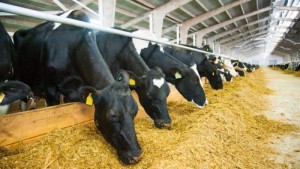Biofuels in the EU are deeply intertwined with global food and feed markets. As the EU discusses its future biofuels policy, their contribution to the bloc’s animal feed supply and impact on food prices have emerged as major battlegrounds between supporters and critics.
In its proposal for the recast of the Renewable Energy Directive for 2021-2030 (RED II), the European Commission called for a reduction of the cap on first-generation biofuels, made from food crops, used in the transport sector from 7% in 2020 to 3.8% in 2030. The proposal is currently being debated in the European Parliament’s committees ahead of a final vote in January 2018.
The proposal is currently being debated in the European Parliament’s committees ahead of a final vote in January 2018.
Critics of EU biofuels policy have welcomed the move, saying it will reduce pressure on food prices. Farmers and biofuel producers, on the other hand, argue that biofuels have had very little impact on prices, while providing farmers with an income outside the subsidised CAP framework and boosting Europe’s autonomy in animal feed.
One thing is for sure: a biofuels phase-out will have far-reaching consequences for farmers and global agricultural markets.
Cutting feed imports
By-products from biodiesel and bioethanol crops generate some 17 million tonnes of feed for EU livestock every year.
According to the association of EU farmers and agri-cooperatives Copa-Cogeca, EU support for first-generation biofuels under the 2009 Renewable Energy Directive (RED I) has cut the bloc’s dependence on imports of animal feed proteins by 10%.
“First generation biofuels produced from arable crops grown in the EU replace four to five million hectares of soya that would otherwise be imported from third countries, mainly in South America,” Copa-Cogeca stated in a recent report. Around 4.4 million hectares of arable land in the EU and 3.5 million hectares outside the EU are used to grow the bloc’s biofuel feedstock.
For Marijana Petir, a Croatian MEP (EPP group) and member of the European Parliament’s agriculture committee, this should be a powerful argument against phasing out first-generation biofuels. Not only would this leave farmers more dependent on imports, she told EURACTIV.com, but “in contrast to the feed produced by the EU biofuel industry those imports will be based on genetically modified (GMO) material”.
What is more, “cutting feed imports to the EU also helps to reduce the ILUC impact [of animal feed] in third countries”.
But a recent report by Cerulogy, which compared more than 100 economic modelling studies on the effect of biofuels on food markets, found that while they made a “not negligible contribution” to meeting the demands of the EU livestock industry, they did not fundamentally alter the EU’s dependence on imports.
Europe’s farmers still import around 70% of the plant protein they need to feed their livestock. The majority of imports come from South America, costing €12bn per year.
And the cut in imports has not necessarily driven down feed prices in Europe. A recent European Commission report also found that biofuel demand had actually increased prices for oilseed-based animal feeds.
Broad consensus on food price increases
Biofuels producers and supporters argue that the industry has had a very limited impact on EU food and feed prices.
“The increase in food prices is nothing more than a myth,” said Petir. “This myth has been comprehensively dismissed: the OECD, the World Bank and the UN FAO all accept that the driver of food prices was a spike in oil prices.”
What is more, ePure, the European renewable ethanol association, argues that EU-grown biofuels even have the power to iron out these fluctuations by cutting the bloc’s dependence on fossil fuel imports.
“Over 60% of food price increases are caused by crude oil prices, not the production of biofuels. By displacing fossil fuels, biofuels can mitigate the effect of crude oil on food prices,” ePure stated in a 2017 factsheet.
But the Cerulogy report found a wide consensus that increasing biofuel demand had indeed resulted in increased food prices.
“Claims by biofuel advocates that this is a ‘myth’ stand in wilful contradiction of this evidence base, and are often supported by a variety of disingenuous claims and half-truths,” the report stated.
And crucially, “returning [protein-rich by-products] to livestock feed markets is not enough to eliminate any negative impacts on food prices”.
Copa-Cogeca estimates that biodiesel has had a 4% price effect on global food oil crops and bioethanol, a less marked effect of 1-2%.
Cerulogy predicts a 0.6% higher global cereal prices and 8% higher global vegetable oil prices if the 7% crop-biofuel is kept, compared to phasing them out. This, the report’s authors say, means that a decision to keep the 7% cap on biofuels in transport for 2021-2030 would cost consumers and other users of oils and biofuel feedstocks $19bn by 2030.
Broader market disturbances
But the industry argues that the economic impact of the biofuels phase-out will reach far beyond food and feed prices and could create broader market disturbances.
“Stable agricultural markets lead to increased investments and increased productivity, which is beneficial for food as well as biofuels,” the Copa-Cogeca study stated. “Conventional biofuels are not automatically synonymous with market conflicts.”
And simply finding new markets for the newly generated surplus is not a viable option, according to the industry.
“There is no alternative outlet in the EU to absorb 6.4 million tonnes of rapeseed oil. Neither is it realistic to consider that this volume will replace imported tropical oils,” Nathalie Lecocq, the director-general of Fediol, the organisation representing the EU vegetable oil and protein meal industry.
“Exporting such volume to the world market would not be possible either, without a considerable cut on prices,” she added. This view was supported by Copa-Cogeca Secretary-General Pekka Pesonen, who warned that a phase-out of biodiesel in the EU would cost farmers €300 per hectare.
“No alternative”
What is more, the Fediol secretary-general said that if oilseed producers, who provide the raw materials for biodiesel, were to switch to other crops, such as wheat, it would “drive crop prices down across the board, reducing farmers profitability”.
Cereal prices have already fallen 40% in three years due to record global production. Converting the EU’s rapeseed fields to wheat would increase EU production by 15% and further undermine prices.
“In short, there are no economically viable alternatives to rapeseed production,” Lecocq said.
For ePure, the European renewable ethanol association, this is an argument in favour of increasing the cap for bioethanol in EU transport. The association says the fuel ethanol industry currently uses only 2% of EU grain production, so does not compete for resources with food or feed markets.
The Copa-Cogeca report supports this view, saying that these cereals would otherwise have been put in storage as supply far outstripped demand.
A European Commission spokesperson defended the EU executive’s decision to cut the cap on biofuels in transport from 7% to 3.8%, saying “their contribution towards reducing GHG emissions is considered to be limited”.
What is more, “this will further reduce the pressure markets for food and feed,” the spokesperson said.
Source: euractiv.com
Ask me anything
Explore related questions





